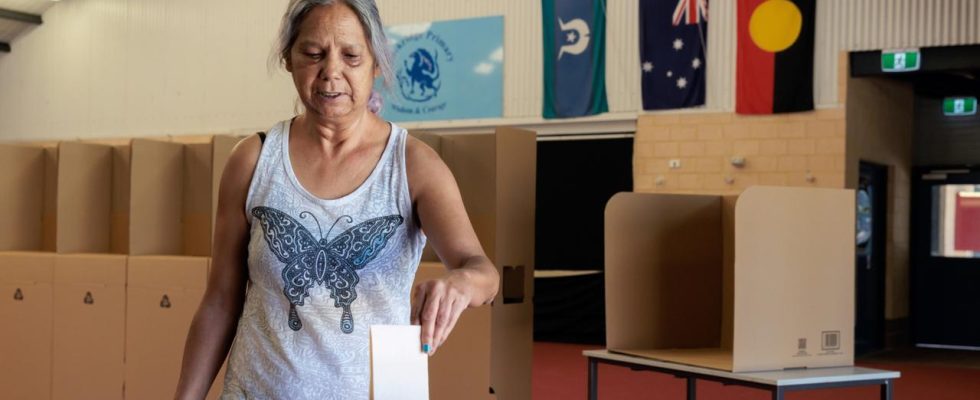Many Australians are very disappointed by the rejection of more political say for Indigenous people. Observers say it shows that Australia has not yet fully come to terms with its colonial past.
After the election results were announced, there was great disappointment among supporters – especially among indigenous people. With a clear no, the majority in Australia rejected a change to the constitution that was supposed to improve their lives and everyday life. Around 60 percent of the population spoke out against giving the indigenous population more say.
“I would have thought Australia would give its weakest people a fair chance. The result shows something different. I’m very disappointed,” says Robyn Collard from Perth, Western Australia, at an election party.
“It will take time for wounds to heal”
“I am devastated and it will take time for these wounds to heal,” said co-author of the Uluru statement, Jesse Fleay. But he is also optimistic: “For the first time in a long time, Australia has spoken about its national identity.”
Esme Bamblett, a member of the First Peoples’ Assembly in the state of Victoria, said: “One reason the referendum failed is misinformation. A lot of Australians don’t know much about Aboriginal people. They don’t know what we’re going through, they don’t know that The extent of the disadvantage is still our history.”
Social exclusion, low incomes
With the arrival of the first British settlers, the indigenous people experienced persecution, death and exclusion. Until the 1970s, indigenous children were torn from their families and re-educated in white families or Christian institutions.
“This trauma continues to this day,” says Indigenous activist Mervyn Eades. He campaigned for yes votes in Perth until the very end. “It feels like we are not wanted in our own country. We have lived here for 65,000 years – and we are asking the people who came only 230 years ago for recognition in the constitution.”
The everyday life of indigenous people in Australia, who make up around three percent of the population, is characterized by social exclusion. Most have low incomes and little chance of economic advancement. The crime rate is significantly higher and life expectancy is eight years lower than in the rest of the population.
Defeat for prime minister Albanese
The referendum was about creating an advisory body for parliament and the government on indigenous issues. Instead of talking about, we should talk to the indigenous people. But the no camp prevailed.
The Australian Barbara Bradbury explains her no like this: “I think a yes would have divided us. And you can’t say yes to something whose consequences you can’t foresee.” Voter Joshua Tan says: “The way the committee was set up, it wouldn’t have served its purpose. It wouldn’t have solved the problems, it was all too vague for me.” And a man with a big “No” on his shirt explains: “I think we’re already doing enough for the indigenous people. It would just have been more bureaucracy for the government.”
The no vote is also a defeat for Australia’s Prime Minister Anthony Albanese. The referendum was one of his central election promises. Now he is calling for unity: “This moment of disunity will not divide us. We are not a nation of yes-sayers and no-sayers, we are all Australians.”
The referendum failed this weekend. However, the debate about political participation and recognition of indigenous people in the constitution will continue to concern Australia.

